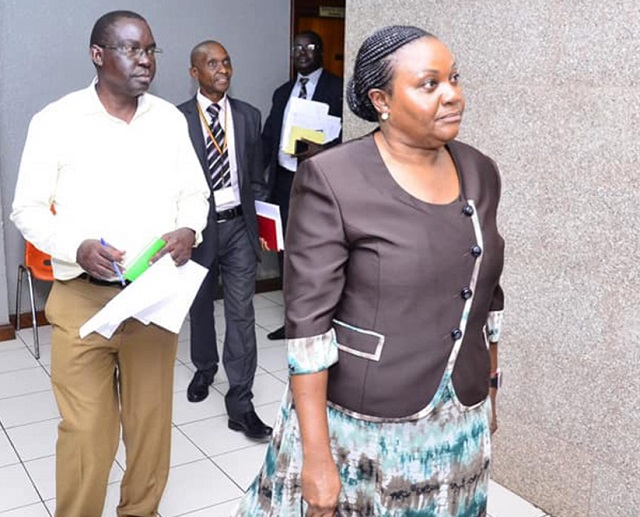
Scourge of corruption
Corruption has been described by observers of Ugandan society as one of the biggest challenges facing the country’s development aspirations of becoming a prosperous and perhaps welfare state by 2040.
Corruption has become an accepted means of getting by in the country,” says a recent report by the Bertelsmann Stiftung Index, a German foundation that does research on socio-economic reform around the world.
Advisories on corruption in the country are common when prospective investors are seeking strategic investment information on Uganda.
“The police, the judiciary and procurement are areas where corruption risks are very high and under-the-table cash payments are expected,” says a 2017 report on Uganda by GAN Integrity, a U.S based Technology Company that manages corporate compliance programmes for over 140 global companies, “Corruption challenges are exacerbated by weak law enforcement, which fuels a culture of impunity.”
Last December, President Museveni flanked by several high profile government officials, religious leaders and civil society walked a stretch of about 4km alongside thousands of citizens to demonstrate government’s commitment in the war against corruption.
The president later addressed a rally at the Kololo Independence Grounds saying the corrupt people are parasites. “They are parasites because they get wealth which they did not earn,” he said. Museveni said it is the responsibility of political leaders to end the vice by organizing the economy in such a way that the people meet their needs.
But, Leonard Okello,the CEO of the Uhuru Institute for Social Development, a Kampala-based think tank, told The Independent that the “untouchable” question is just one among several challenges that anti-corruption crusaders like Lt. Col. Nakalema have to grapple with in Uganda.
Although he says this must be handled decisively, Okello says “the ethnic-religious software” which is at the forefront of politics in Uganda and Africa in general has often dented the fight against corruption.
“This reality puts Nakalema into a very challenging and complex historical problem,” Okello told The Independent on Oct.22.
Okello says he remembers the zeal with which the NRM government came to uproot corruption in Ugandan society.
He says he even remembers Museveni’s new government coming up with an initiative where every ministry was tasked with setting up a commission of inquiry. These commissions were to investigate corruption and abuse of office from 0ct.10, 1962 to Jan.25, 1986. He says, 35 years later, no one knows what happened to those reports.
Okello told The Independent that corruption gained a foothold the moment President Museveni began explaining away and justifying certain misdeeds by government officials who are close to him.
He recalls President Museveni justifying the US$ 800,000 bribe his young brother, Salim Saleh, took in the 1990s from a helicopter gunship deal that was marred with corruption. Apparently, the Justice Julia Ssebutinde commission blamed President Museveni for advising his brother to accept the bribe and use it for a special operation in northern Uganda.
At the time, Saleh was the special adviser to the president on Military and Political Affairs in the north during the Joseph Kony-led insurgency in northern Uganda. Okello also told The Independent that the corruption fight was also lost the moment historical members of the NRM government began acting with impunity even after being implicated in corruption.
Okello again recalled the stand-off between Jim Muhwezi, the then Minister of Health with Justice James Ogoola during the commission of inquiry into the Global Fund scandal in 2006.
When Muhwezi appeared before the commission in March, 2006 and Justice Ogoola demanded that the minister apologize for his ministry’s mismanagement of the Global Fund and that the minister should personally take responsibility for the mess, Muhwezi attacked Ogoola asking him where he was when they (NRM historicals) were fighting.
He accused Ogoola of hiding under his bed when the rest were fighting. Okello told The Independent that this was the time when there was change in public perception of “certain people.” This was the time when people started thinking that there are people in Uganda who think they are entitled to impunity, he says.
“This affected the national psyche,” he said, “It made people think that there are people who think they have a right to get certain things.” Okello told The Independent that until Uganda goes the South Korean way where there is a price to pay for everybody who indulges in corruption; Nakalema’s talk will remain so.
“It must be clear to everybody that whoever indulges in corrupt practices, whether it is the president’s son, daughter or former combatant does not get away with it,” he said.
****
 The Independent Uganda: You get the Truth we Pay the Price
The Independent Uganda: You get the Truth we Pay the Price



Recovering Ugx 240 Bn cash in only 2 years is exceptional performance.
Keep up your excellent work Nakalema.
You have outperformed other dormant anti-corruption institutions that have existed for so many years.
**Public Servants steal a lot of government money.
Thanks for ur effort towards the so called untouchable. For all over these years they thought no body can pin them down since the playground was theirs but wat is done is just a beginning of it all en I wish u stronghold them and they account for everything their hands has taken
Thanks for the trustworthy u have showed the one that chose you to take this action